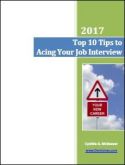 |
||
Typical Interview QuestionsReview these typical interview questions and answers to get you ready for even the toughest interviewer. Preparation is the key to a successful interview. If you spend time working your way through the questions we've provided, you'll see that developing a good answer for typical interview questions is not as difficult as you might think. While we often use functional examples in our sample interview answers (e.g. sales, marketing, operations), you can adapt our advice to virtually any functional specialty. The principles we're sharing are the same, regardless of your profession. When you've got a handle on the job interview questions below, click through the link at the bottom of the page and take a look at our next set of interview questions and answers. Our objective is to give you some insight into what the interviewer is looking for so you'll be ready with a good response. WHAT ARE YOUR SHORT TERM GOALS -- OVER THE NEXT 1-3 YEARS?Someone once said that if you don't know where you're going, any path will take you there. Professionals who are at the top of their game have a plan. They know where they've been and where they're headed, and more importantly, how they plan to get there. A job interview is the perfect context for this question. You can frame your answer in a manner that's consistent with the job you're applying for. Let's say that you're currently a Sr. Sales Director, leading a team of 25 sales professionals in a large geographic territory. You're interviewing for a VP Sales role... Short term, I'm interested in moving into a national sales management role with an organization that emphasizes profitable growth. My team has consistently been the top performing team in the country and I believe that I can leverage my success at the regional level on a national basis. I've got a reputation for growing and developing my people, which I think is a key skill in a national sales leader. I've also got a reputation for driving profitable growth for my organization. I've always been able to motivate my people to strive for excellence. WHERE DO YOU SEE YOURSELF IN 5 YEARS?Much of what is said in question 4 can be adapted to this typical interview question response. The interviewer is trying to find out whether you're a goal oriented person, and if you have a plan to achieve your goals. In most cases, companies like to hire ambitious go-getters -- people who have long term goals in mind for their career. Although all companies need "solid citizen" performers, contrast the answers we've been talking about to someone who says that they want to retire doing what they're doing today... While there's really no right/wrong answer to the "where do you see yourself" question, think in terms of upward mobility and key challenges you would like to tackle in your career. Upward mobility is not the only answer. You need to think about how you plan to grow personally and professionally over the next 5 years, and how you will add value to the organization over this time horizon. WHAT ARE YOUR KEY STRENGTHS?In answering this typical interview question, please don't say "I like to work with people." We all like to work with people! Think about what you're really good at. Problem solving, coaching and mentoring people, project management, motivating a team, closing, reaching key decision makers...these are key strengths. Like building your accomplishments on your resume, think about strong, action oriented words to describe your key skill set. And, one note of caution: Make sure that you have a clean online reputation. You would be surprised at how many companies "Google" your name to see what kind of online reputation you have. This can make or break a possible future job. When a potential employer Googles you, you want them to see job related skills - not highlights of the skills you have when you're not on the clock! Pay attention to what the position description talked about and try to incorporate strengths that are consistent with the position you're applying for. I'm not suggesting that you misrepresent your strengths. Only that you emphasize at least a couple of strengths that are consistent with the requirements of the opportunity. If the company needs a strong closer with a track record of exceeding quota, and that describes you accurately, talk about it. Don't focus on a strength that's not required for the job! Back up the strengths that you site when answering this typical interview question with some brief examples. More typical interview questions can be found in these sections: |
|
|
|
[?] SUBSCRIBE
|
||
About Us | Contact Us |
Privacy Policy |
||





